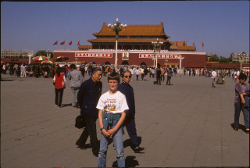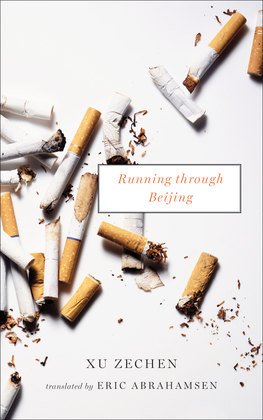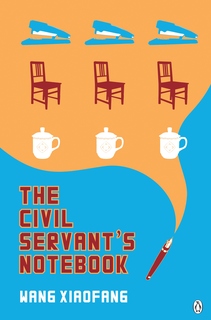Posts
By Eric Abrahamsen, October 25, '07
Joel Martinsen had an excellent post on Danwei yesterday about the new novel by Jia Pingwa, called Gaoxing (Happy). I haven't gotten around to picking up a copy, but I am halfway through Jia's previous masterpiece, Abandoned Capital, and absolutely loving it (more on that in the next week or two). Gaoxing is apparently the fictionalized life story of one of Jia's old childhood friends, and looks at first glance as though it might be similar to Jia's last novel, Qinqiang. We'll have to read it to see…
By Eric Abrahamsen, October 23, '07
We recently received word from an undercover Paper Republic field operative in the world of American academia, code name Julie H. (alias J. Hackenbracht). Pursuant to our earlier post on road literature she sends us links to two fascinating books available on Google. While they both fall squarely on the travel literature side of the travel literature/road literature divide, they’re not the average travelogues.
The first is The Silent Traveler in London, published in 1938, mostly interesting because it reverses the Theroux/Hessler paradigm of the western traveler writing for an audience back home. Here, Chiang Yee (presumably Yi Qiang in pinyin) describes London and British society for his compatriots. He comes off as having a delightfully turn-of-the-century combination of pluckiness and delicacy; I can’t tell if it’s because of the contemporary translation, or because of sensibilities that really were common to many nations at that time. He’s very sensitive to the weather (the book is arranged according to seasons), and provides many little prose passages and poems describing parks and wind and leaves – the Chinese and the British may have this in common. Somewhat surprising were his very modern meditations on the plight of British women:
Oh, life, it is difficult for everybody. But I am inclined to think it has been always even more difficult for women than men. Our Chinese women may have suffered a great deal from lack of freedom in the old days, but they all hoped to become the rulers of houses and to be served and highly respected by their sons and daughters. Now they enjoy equal rights and as much freedom as English women enjoy, and they can still expect to become rulers of houses as well, and to have filial children.
The second book is Great Women Travel Writers, which includes a tantalizing, sadly truncated chapter on Xie Bingying (1906-2000). Two pages are all that Google allows us – just enough to know that Xie was forced to experience footbinding as a child, but not enough to tell us where her damaged feet nevertheless managed to take her.
By Eric Abrahamsen, October 23, '07
ESWN, the first place to look for all things Zhang Ailing-related (as well as a good deal else), posts a transcribed letter from Hu Shi to Zhang Ailing (aka Eileen Chang) on the subject of her novel Qiuge (秋歌). This is part five of a series of reproductions of Zhang Ailing’s letters…
The South Bend Tribune carries an article on an ink-and-wash art exhibit by Gao Xingjian at Notre Dame University. A nice background on Gao is accompanied by a really rather astonishing sample of his painting.
By Eric Abrahamsen, October 14, '07
The Beijing Foreign Languages Printing House, once the country's sole purveyor of Communist propaganda, is struggling for solvency.
Upcoming: the shortlist of the Man Asian Literary Prize (aka the 'Asian Booker') will be announced on the 25th of October.
Rejoice, for Jonathan Spence hath published another book. This one is on the 17th-century historian and essayist Zhang Dai, and sounds excellent.
More soon…
By Eric Abrahamsen, October 1, '07
Who knew? Apparently a shady consortium of literary types known as the International Federation of Translators pulled some strings in the UN, leaned on a few world leaders, and got September 30th (that’s today) declared International Translation Day. Good to know we’ve got the clout of a transnational cartel behind us! Ruining the effect slightly is this year’s rather apologetic theme: “Don’t Shoot the Messenger!” Granted, there are incidents of violence against translators (though I can only think of the Rushdie situation at the moment), but this is hardly the way to signal our pride. Rectify the situation! Today’s your day to read a book in translation, brush up your foreign languages, or kiss a translator.
If you’re curious, September 30th was picked because it was originally the day sacred to St. Jerome, best known for translating the Bible into Latin.
By Eric Abrahamsen, September 28, '07
Recently my in-laws came to visit, and while they were here we found ourselves, as is our wont, singing old Cultural Revolution songs. So far 物产阶级文化大革命 The Great Proletarian Cultural Revolution is Good is my favorite, in part because it’s got a great bouncy rhythm, but mostly because the lyrics are batshit insane. Here’s the chorus:
The Great Proletarian Cultural Revolution is Good,
It is Good,
It is Good,
It is Good.
How’s that for nuance? More comes later, about overthrowing the imperialists, but really all you need to know about the Great Proletarian Cultural Revolution is in the first, second, third and fourth lines of the chorus. The curious thing about this song is the phrase 就是好, which translates most simply as ‘It is Good’, but actually conveys something along the lines of ‘It is Good (And That’s Final – No Matter What Anyone Says)’.
The point of the song, in other words, is not simply that it’s good, but that it is a priori good; it is good without needing any reason to be good; the answer to the question ‘is it good?’ is already ‘yes’ before the question is even voiced; in fact, we’d really rather you didn’t ask that question, because simply asking sounds suspiciously like doubt. You wouldn’t be looking to get struggled against, would you?
More…
By Eric Abrahamsen, September 19, '07
Last Tuesday, the 11th, brought the publication of a 'China’s Strongest Writers' ranking, put out jointly by Sina’s book channel and something called the ‘ranking list website’. Specifically it seems to be the handiwork of a guy named Wu Huaiyao: as a related Phoenix TV article puts it, we’re seeing the creation of a “new internet career – the professional ranker.” It was Wu who brought us 'China’s Most Wealthy Writers' last year; that key issue out of the way, we’re now getting around to their actual strength as writers.
Much as the whole thing reeks of media circus, it’s still worth a look. Wu Huaiyao, no dummy, went to ten of China’s most influential literary critics to nominate the 58 writers who formed the basis of the list. Zhu Dake and Xie Youshun (who has a blog post about it) are probably best-known among the critics, and Zhu gets most of the media attention. He warns that strength does not equal influence does not equal earning power, and gets a few digs in at the inanity of last year’s wealthy writers ranking.
The list itself is here (scroll down past the Lord of the Rings splash page; it’s all in Chinese but there are pictures!). The top ten writers are as follows:
More…
By Eric Abrahamsen, September 8, '07
It was originally Gordon Fairclough’s article in the online WSJ that got me thinking about road-trip literature in China, and now on top of that, wouldn’t you know, it happens to be the 50th anniversary of Kerouac’s On The Road. On The Road is one of a few discrete chunks of foreign literature (others include the works of Borges and Milan Kundera) that, for various reasons of historical accident, floated across the sea and became trendy here. There are readers who wouldn’t know Hemingway’s beard if it turned up in their soup, but by god they could point out Vesuvio Cafe on a SF street map.
Fairclough’s article mentions a growing road-trip literature in China, and cites “‘Go the Distance Now,’ a book chronicling five years spent traveling around China by car.” One travelogue does not a road-trip literature make, but it started me thinking – Kerouac’s popularity must point to some kind of latent interest in this sort of thing, and really, China is the perfect country for road literature. It’s obscenely large, for one. It sports unbelievable geographical and cultural diversity (anyone who believes in the homogeneity of the Chinese, including the Chinese themselves, needs to take a road trip). It’s traditional culture encourages stasis, and trepidation about venturing away from home. The place is ripe for some maverick to demonstrate the heady joys of having the wind in your hair. Actually, a fair number of younger, middle-class adventurers are discovering that for themselves, but as far as I know they have yet to find their bible.
So what have we got? Journey to the West aside, Ma Jian’s Red Dust is probably the closest thing there is to a road-side portrait of China. But it’s an awfully political book, and I wonder how many people actually read it inside the country. Xu Xing’s You Can Have Whatever’s Left, a picaresque about a couple of rogues wandering the country, definitely qualifies. I suppose even Gao Xingjian’s Soul Mountain counts, although that struck me less as road literature and more as one man’s tiresome journey through his own angst-ridden impotence (ahem).
How about it? What am I missing?
By Eric Abrahamsen, August 23, '07
Cindy and I are currently working together on a subtitle translation project, for the short documentary films coming out of Ai Weiwei’s Fairytale project. Among the 1,001 Chinese people that Ai Weiwei shipped to Kassel, Germany, fifteen or sixteen filmmakers were included, and they’ve produced a series of small films about certain of the ‘artists’.
My first short film centered around Gouzi and Zhang Chi, which was a pleasant surprise as I’ve only known them, Gouzi in particular, by their writing. Gouzi is mostly famous for being drunk, it seems, and in fact the whole hour-long spot is sodden (the first shot is Zhang Chi blarging in someone’s bathroom). Most of it takes place at group dinners in various restaurants and living rooms around Beijing. The subjects represent a certain slice of Beijing’s literary community – 35 to 50, once hot young bloods, all devastated in one way or the other by the events of June 4th, 1989.
More…
By Eric Abrahamsen, August 21, '07
I'm re-reading George Steiner's After Babel, one of the great theoretical texts on translation, and this passage made me laugh:
Thus any light I may be able to throw on the nature and poetics of translation between tongues has concomitant bearing on the study of language as a whole. The subject is difficult and ill-defined. Regarding the possible transfer into English of Chinese philosophic concepts, I. A. Richards remarks: 'We have here indeed what may very probably be the most complex type of event yet produced in the evolution of the cosmos.'
By Eric Abrahamsen, August 1, '07
Yesterday Bookslut ran an interview with Didi Felman, editor of Words Without Borders, on the joys and travails of running an indie webzine. In the midst of it she dropped a hint that WWB had an upcoming feature entitled 'Olympic Voices from China', so if any writers are currently reading this, hurry up and write something… Olympic? (via Three Percent)
By Eric Abrahamsen, July 29, '07
Yan Lianke is quite the interview subject! Australian paper The Age just ran a very long piece on Yan, which gives a wider window on his early development and attitudes towards writing than previous articles. He also mentions his current work in progress, possibly to be published next year:
The work in progress is an unflattering fable, "funny and ridiculous", about China's contemporary intellectuals, who Yan believes have been co-opted by the Government. "They lack the courage to face up to the real situation," he says.
Asked what the real situation is, he replies promptly: "Chaos. China is in chaos, politically, economically, medically, morally and some people are the beneficiaries of this chaos, including intellectuals. Those at the grassroots, the masses, are the ones suffering, but in facing this kind of situation Chinese intellectuals can't see clearly."
In the past, Yan says, there were great pressures on writers and it was understandable to some degree that people didn't dare speak out. But now, he says, there is no excuse. "Now it is a self-imposed censorship, so the situation is more tragic."
By Eric Abrahamsen, July 28, '07
Before we get started here, a disclaimer: we didn’t start this site to snipe at existing translations, or hint haughtily that we could have done better ourselves, had only the gods of publishing smiled on us, rather than some other. Sour grapes have we none. And yet, the pain of seeing a favorite book or author to which justice has not been done… O, how the fingers itch to make amends! And so some of us have put together our own versions of the first chapter of Wang Xiaobo’s 黄金时代, not because Wang in Love and Bondage was so terrible, or our translations so much superior – think of them rather as fond tangents sprung from a work we found adept enough for inspiration, but not satisfaction. We offer them in the spirit of giving. They are also short, so as not to bore.
That spring, the team leader said I’d blinded his dog’s left eye, and now she looked at you cock-headed, like a ballet dancer. Since then he’d been making life difficult for me.
This download has been removed.
By Eric Abrahamsen, July 25, '07
A few days ago the Man Asian Literary Prize (aka the Asian Booker) announced the long list for its 2007 prize. Amid a large number of Indian candidates were a few familiar names: Mo Yan’s Life and Death are Wearing Me Out, Xu Xi’s manuscript Habit of a Foreign Sky, Guo Xiaolu’s 20 Fragments of a Ravenous Youth, and Jiang Rong’s Wolf Totem. Fleeting Light by Taiwanese writer Egoyan Zheng is also up there.
Five out of twenty-three: not a terrible showing for China, though clearly we’re not cranking them out like the Indians are (apparently two-thirds of submissions came from South Asia). It’s a happy day for Howard Goldblatt as well – the English versions of Wolf Totem and Life and Death are Wearing Me Out are both his handiwork.
The three-judge panel will select a five-book short list in October, and announce the winner November 10th in Hong Kong.
By Eric Abrahamsen, July 23, '07
There's a lengthy interview with Howard Goldblatt posted on Full Tilt, a "journal of East-Asian poetry, translation and the arts" put out by the English Department of the National Central University in Taiwan. It's the longest interview with Goldblatt I've seen.
No, the thing that's really killing translation in our field is literalism. Too many translators are afraid of the text, especially when they're first starting out. And I understand that, because I was too. They're all afraid of the text. You need to overcome your fear of the text, put some distance between you and it.
Good advice! (via danwei)




